Approaches to Biblical Studies Collection (6 vols.)
Digital Logos Edition
Overview
The volumes in the T & T Clark Approaches to Biblical Studies have been primarily developed for those interested in biblical studies in theological or ministerial education, and are designed to introduce the reader to the various approaches to the study of the bible. The series is ecumenical, and all the writers are professionally engaged in the teaching of biblical studies.
These six volumes, written by prominent scholars such as Steve Moyise (editor of the series), Clive Marsh and Paula Gooder, will not only be of interest to academics and pastors. The lay person will also find these introductory guides interesting, useful and challenging. Each book is written so that the beginning student and average reader can understand the content without getting lost or overwhelmed by extensive scholarly terminology. Many of the volumes include maps, charts and discussion questions; and most of the chapters end with a comprehensive summary or conclusion and a small list of books for further reading.
This collection concentrates on many of the current perspectives surrounding important issues that face today’s Christian. The Introduction to Biblical Studies covers such topics as the sacraments, form criticisms of the psalms and gospels, retrieving women’s voices in the Bible, and postmodernism resistance. In its final chapter the author insists that because the Scriptures are the sacred text of the Christian church, biblical interpretation should be an activity performed more by the church than by the academy. An Introduction to Revelation: A Pathway to Interpretation explores history-based interpretations, predictive prophecy, images and themes, and the relevancy of Revelation to today. Jesus and the Gospels explores the various perceptions each gospel writer has of Jesus and concentrates on their comparisons and differences. The chapter on the twelve factors of Christology is especially poignant and insightful. Joshua to Kings: History, Story, Theology concentrates on the historical, literary, sociological, and theological aspects of this important period in Israel’s history, from conquest of the land to the development of a nation, from women in Judges to the Davidic empire, from the Torah as social order to the character of God. The Old Testament in the New establishes a foundation for the Christian to be confident that the NT writers believed that Jesus fulfilled OT prophecy. Beginnings are important, argues the author of The Pentateuch: A Story of Beginnings and throughout the book she shows how critical the first five books of the Bible are for us today, tackling such controversial subjects as the two creation accounts, the sons of God and the daughters of humans, the Sarah/Hagar affair, exodus and liberation theology, and ethics and law codes.
This title is included in the following collections
You can save when you purchase this product as part of a collection.
Logos 8 Pentecostal & Charisma...
$2,999.99$2,999.99Logos 9 Pentecostal & Charisma...
$4,749.99$4,749.99Logos 6 Collector's Edition Le...
$11,399.99$11,399.99Logos 8 Ultimate Legacy Librar...
$21,749.99$21,749.99
- $24,999.99

Product Details
- Title: T & T Clark Approaches to Biblical Studies Collection
- Publisher: T & T Clark
- Volumes: 6
- Pages: 864
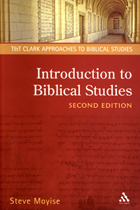
This concise introduction provides a clear and helpful guide to the complex field of modern biblical studies. In the first section, it addresses questions regarding inspiration, canon and authority, while also delving into the historical approaches to the Bible regarding sources, content and intentions. The historical approaches conclude with a discussion of the text of the Bible, with topics focusing on the transmission of manuscripts and the art of translation. Within this context, Moyise uses comparative literature to examine such topics as ancient flood stories and Egyptian psalms.
In the second section, the book tackles questions about how we got the Bible and why modern versions of the Bible differ among themselves. The chapter on literary criticism considers how biblical texts 'speak' to the reader and influences his or her attitudes, emotions and behavior. It addresses such concerns as gender, ethnicity and social location and how these affect what people regard as important and hence how they interpret the Bible. The book concludes with a variety of theological approaches as it looks at different approaches to biblical interpretation.
Steve Moyise is Professor of New Testament at the University of Chichester and author of The Old Testament in the Book of Revelation, The Old Testament in the New, and The Psalms in the New Testament. He is the series editor of The T&T Clark Approaches to Biblical Studies.
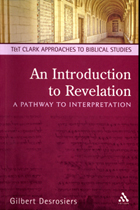
The interpretation of the book of Revelation has always aroused controversy, and its use (and abuse) during periods of rapid historical change has often been a cause for great concern. This volume of biblical studies attempts a responsible reading of Revelation. The author presents the reader with both the tools and the information required to understand the many approaches that may be taken to interpreting the book, and leads the reader toward a sound interpretation.
In this important look at Revelation, Desrosiers presents traditional and new interpretative approaches. Concerned that Revelation has often been ignored by Christians and churches alike, the author shows how Revelation is relevant to today’s pastor and the twenty-first century Christian.
Continuum is to be congratulated on producing a stimulating book which offers a fresh approach to the Book of Revelation.
—Biblical Interpretation: A Journal of Contemporary Approaches
Gilbert Desrosiers is Master of Christian Studies, specializing in New Testament, at ICI University, Irving, Texas.
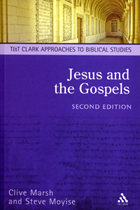
This book offers an ideal introduction to the Gospels and explains why it is that scholars and lay people have such different understandings of the person of Jesus. Not content to merely present the historical figure of Jesus, it also presents the particular "image" or "images" of Jesus that are conveyed within the biblical texts. While devoting a chapter to each of the four Gospels, which are the primary sources of our knowledge of Jesus, the authors also include a chapter on the apocryphal gospels. In doing so, they investigate the portrayal of Jesus in all of these gospels, using the tools of historical and literary criticism.
Other chapters look at Jesus in his role as prophet, teacher, and sage. Extra-biblical factors—such as art, media, and culture—can shape our understanding of Jesus, and this book does not shy away from tackling these influences. Our images of Jesus are formed not only by an interplay of faith and history, but also church affiliation, social context and gender. Jesus and the Gospels helps the reader see how these factors affect our interpretation of the Gospels and consequently our understanding of Jesus.
It is for students and teachers....and should serve them well...The book's virtue is its brevity. It is easy for students to use.
—Rev David Blatherwick, Methodist Recorder, 2006
Clive Marsh is Secretary of the Faith and Order Committee and a Local Preacher in the Methodist Church in Britain. He is professionally involved in theological education in church and university settings.
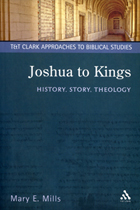
The Old Testament tells the story of a particular nation, ancient Israel, from its origins to its collapse in the face of foreign invaders. But what sort of story is this? How does it fit in with the findings of archaeological explorations of ancient Syro-Palestine?
Joshua to Kings picks up the aspects of Israel’s story as told in the books from Joshua to 2 Kings, that of an actual historical society and that of a literary presentation of a nation, told from a religious perspective. By exploring the contents of these biblical texts the student is led into the use of basic tools for biblical study, such as historical criticism, narrative criticism and ideological criticism, in order to engage in a structured manner with the task of reading and interpreting biblical texts in a twentieth-century world.
This book makes current scholarship accessible to a wider audience, and provides an excellent introduction to the study of the Old Testament in general by its reader-friendly approach. I hope it will be very widely read and used.
—John Braton, Oriel and Laing Professor of the Interpretation of Holy Scripture, University of Oxford
Dr. Mary E. Mills is currently engaged in research and teaching in religious studies at Liverpool Hope University. She is the author of Human Agents of Cosmic Power, The Puzzle of the Gospels, with P. Vardy, and Images of God in the Old Testament.
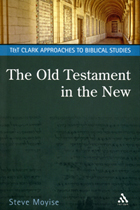
New Testament authors were convinced that they were living in an age of fulfillment, that the Old Testament was being fulfilled in the life and death of Jesus. One cannot afford to overlook such an important influence on the thoughts and writings of NT authors. This book fills the need for an accessible and well-informed introduction to the Old Testament in the New Testament. It explores the basic issues and offers summaries of the uses of the Old Testament in the Gospels and Acts, in Paul’s letters and in Hebrews, James, and Revelation. Issues of quotation, allusion, and echo are fully explored and placed sensitively in the context of differing approaches. Readers are informed of contemporary debates that have arisen from literary criticism, such as the questions of intertextuality and the uses of allegory.
The author also uses the writings of the Qumran community that existed at the time of Jesus to explore how they too believed they were partaking in the fulfillment of God’s promises. This investigation will show what Qumran texts were available in the first century, how they were viewed, and what techniques were used to interpret them.
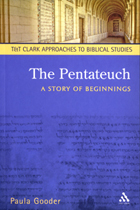
The Pentateuch, the first five books of the Hebrew Bible, traces the beginnings and development of those who would become known as Israelites. The story is told from different perspectives as it portrays God’s relationship with those whom He would call “My people.” The Pentateuch is not only descriptive, recounting what happened, but it gives all those who read it down through the centuries a glimpse at how the world could be.
This book addresses the need for a clear and accessible introduction to the Pentateuch. It presents and analyzes key themes that appear in the first five books of the Bible, including the creation and flood, the exodus and liberation, covenant and land, and law and faith. These themes are explored in their ancient context and from the standpoint of contemporary concerns such as liberation theology, gender issues and ecology.
Paula Gooder is Tutor in Biblical Studies at the Queen’s Foundation for Ecumenical Theological Education, UK.
Reviews
2 ratings

Alessandro
2/20/2023

Ralph A. Abernethy III
9/7/2017